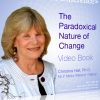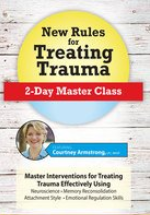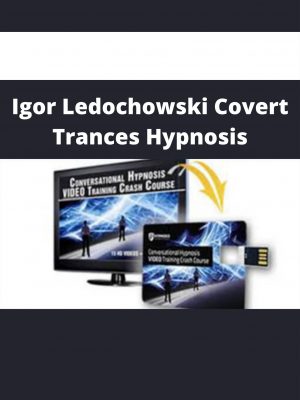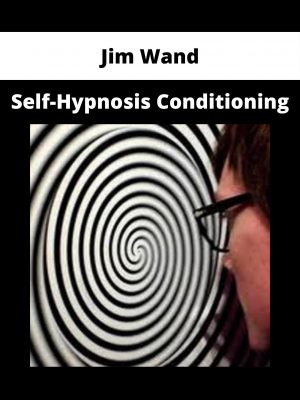Courtney Armstrong – New Rules for Treating Trauma, 2-Day Master Class
$300 Original price was: $300.$113Current price is: $113.
Shopping Instructions:
- DISCOUNT 15% : SHOP15
- Product Delivery: Within 1 – 12 hours after purchase.
Available for Pre-Order. This product will be available within a few days.
Courtney Armstrong – New Rules for Treating Trauma, 2-Day Master Class
In this breakthrough recording, you’ll discover the new rules for treating trauma.
You’ll discover how memory reconsolidation is a recent neuroscience breakthrough that revealed a new way to heal trauma at its roots by process of recalling and updating a memory.
During this workshop, I’ll provide you with step-by-step instructions and techniques you can master in each phase of trauma treatment. This is the trauma training that specifically gives you skills in the phenomena of memory reconsolidation. Let me show you why memory reconsolidation is necessary for transforming your trauma work with clients. I will give you a simple protocol to use to reconsolidate a traumatic memory in as little as one session!
Full of thought provoking lecture, engaging case studies and guided instruction, you will learn the essential skills that your clinical practice is missing to help your clients move forward in living a meaningful life. Leave this master class armed with tools you can use in your very next session.
- Summarize how a client’s emotional trauma is processed in the brain as it relates to case conceptualization.
- Analyze why the use of clinical exposure techniques alone are not enough to relieve post-traumatic stress symptoms.
- Name the 4 primary attachment styles and the clinical implications that each attachment style brings in session.
- Identify 1 therapeutic goal for clients with avoidant attachment style.
- Identify 1 therapeutic goal for clients with anxious attachment style.
- Identify 1 therapeutic goal for clients with disorganized attachment style.
- Breakdown the three phases of trauma informed treatment put to practical use in session.
- Compile recent neuroscience discoveries regarding memory reconsolidation and its clinical implications for treating trauma.
- Characterize the five steps that several evidence-based trauma therapies have in common.
- Utilize two experiential techniques that can be used to resource, uplift, and empower clients to reduce feelings of shame and helplessness.
- Apply two interventions to help clients reconnect to a healthy sense of self, relationships, and the world.
- Discuss how to avoid abreaction and re-traumatization while reviewing traumatic memories in clients.
Would you like to receive Courtney Armstrong – New Rules for Treating Trauma, 2-Day Master Class ?
New Rules for Treating Trauma
Rule #1
Understand how Trauma Impacts the Brain
- How traumatic memories are stored
- How to engage the emotional brain
Rule #2
Consider Your Client’s Attachment Style
- Securely attached clients
- Avoidant/dismissive attachment styles
- Anxious/preoccupied attachment styles
- Disorganized/unresolved attachment styles
Rule #3
Attune, Lift, and Lead
- Attune with right-brain to right-brain communication
- Lift by acknowledging a strength your client possesses
- Lead and motivate clients by focusing on
- what’s desired
Rule #4
Teach Emotional Regulation Skills
- Tools for orienting and grounding
- Tools for calming and self-soothing
- Tools for containment and safety
Rule #5
Part 1 – Reconsolidating Traumatic Memories
- What is memory reconsolidation and why is it important?
- 5-steps for reconsolidating traumatic memories
- Explore embodied beliefs
- Create and install new belief experiences
Rule #6
Part 2 – Reconsolidate Traumatic Memories
- Observationally retell the story with a new ending
- New narrative integration
- Client demonstration video
Rule #7
Facilitate Post-Traumatic Growth
- What is post-traumatic growth?
- Restore resilience
- Create new meaning
- Healthy relationship skills
Applications for Special Populations
- Sexual trauma survivors
- Childhood abuse and neglect
- Traumatic grief after sudden or violent deaths
- Medical trauma, car accidents and disasters
- Children and adolescents after trauma
- Cultures and faith traditions
- Simple self-care techniques to prevent vicarious trauma
Limitations of the Research & Potential Risks Memory Reconsolidation
- Age of the memory
- Repetitively reinforced memories
- Inner conflicts about memory resolution
- Dementia & other neurological disorders
Related products
NLP & Hypnosis
NLP & Hypnosis
NLP & Hypnosis
NLP & Hypnosis
NLP & Hypnosis
NLP & Hypnosis
NLP & Hypnosis
Joseph Cohen – The SelfHacked Secrets To Understanding Why You Are Sick And How To Get Well
NLP & Hypnosis












